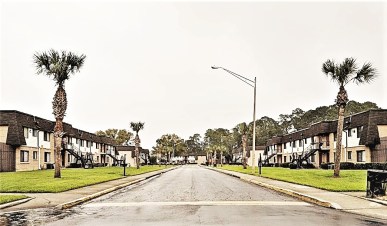by Tim Gilmore, 6/7/2017
Israel Stallings loves the Indian, Iraqi, Indonesian, Vietnamese, Burmese, Bosnian, Ethiopian and Haitian children who call this most diverse community in Jacksonville home.
As program director at Sable Palms Apartments on Emerson Street, he sees children of different religions, clothing styles, holiday rituals and ethnic backgrounds growing up together on the complex’s sidewalks and playgrounds. He’s been surprised at times by Indian attire or dramatic African face-paint, but the children of Sable Palms don’t bat an eye.
“It’s just like they’re brothers and sisters,” Stallings says. “They play together every day. It’s their norm. I mean, it’s amazing. There’s almost never any turmoil.”
Sable Palms consists of 300 apartment units built in 1969, providing Section 8 low-income rental assistance for a community of around 1,000 residents. The apartment complex has worked with Lutheran Social Services of Northeast Florida to help settle international refugees since the early 1990s.
Stallings is tall, broad-shouldered and affable. His voice is big and kind and his laugh may be the heartiest you’ll ever hear.
“A lot of the younger kids don’t really understand the situations their parents have saved them from,” Stallings says, “but the older kids will tell you how happy they are to be here.”
On a field trip to Kingsley Plantation, a 10-year-old Iraqi girl told Stallings the plantation barn reminded her of where she’d gone to school back home, listening daily to the sound of bombs falling. I cringe to think those bombs well might have been American.

slave cabins at Kingsley Plantation, Duval County, mid-1800s, courtesy National Park Service
Some Sable Palms newcomers with full family units find work quickly and move to a house of their own within a year or two, though in the seven years he’s worked here, Stallings has seen other kids grow to maturity. Sable Palms is a kind of home for him, too, and he believes Jacksonville could learn a lot from this community.
“These are just people who want to be free to live their lives,” he says. “Who could be against that?”
He has no time for the Samuel P. Huntingtons of the world who believe in the inevitable “Clash of Civilizations” or those who assume that different means conflict.
In fact, Sable Palms could teach Jacksonville a lesson in community the same way the United States at large could learn from Toronto.
The Economist recently ranked Toronto the safest big city in North America and the eighth-safest major city in the world. Meanwhile, in 2016, the British Broadcasting Corporation named Toronto the most ethnically diverse city in the world.
While populist American politicians ratcheted up their xenophobia, Canadians responded to achieving their goal of resettling 25,000 Syrian refugees between November 2015 and February 2016 by doubling the goal to 50,000 for the rest of the year.
That’s right. The safest big city in North America is also the most ethnically diverse.
Still, Stallings says, the kids growing up in Sable Palms deal with a fear that previous kids here didn’t. “They’re afraid,” he says, “that Donald Trump is going to send them back where they came from.”
He even hears it in their play. Kids tell each other, “You better watch out or Donald Trump’s gonna come get you and send you back to Africa!” It’s awful to hear, but kids incorporate their anxieties into play, and the 45th president is their bogeyman.
Stallings tries to reassure them and tells them the president can’t do everything he wants to do by himself.
“I tell these kids, ‘Just keep getting your education. I’m gonna see you graduate high school and go to college.’”
Stallings loves the sight of parents in traditional garb from around the world who queue up for the buses when their six-year-olds and 10-year-olds come home from school, and he loves the smell of the wide assortment of foods cooking in the early evening.
“Oh, man!” he says. “You smell all these spices riding the air from every direction, and there’s curry and there’s Asian seafood and rice that’s not what you get at take-out Chinese restaurants, I mean it’s the real stuff, and there’s fish laid out to dry on African blankets in the sun, and it’s like the World’s Fair’s goin’ on in here.”
Clearly, Stallings is surprised by how his life’s turned out. He never expected to become a father figure to kids from dozens of nations. He never planned to become an impromptu cultural ambassador.
“But you know, my life and their lives is part of each other,” he says. “And I just love getting up in the morning. I love the work I do.”







